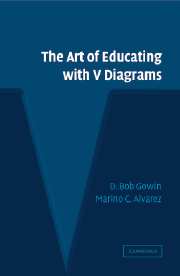Book contents
- Frontmatter
- Contents
- Foreword
- Preface
- Acknowledgment
- PART ONE FOUR COMMONPLACES OF EDUCATING PLUS ONE
- 1 The Art of Educating
- 2 Simplifying Complexity Without Denying It
- Part 1 Summary
- PART TWO THE V DIAGRAM
- PART THREE ANALYZING, EVALUATING, AND CONDUCTING RESEARCH
- PART FOUR REASONING WITH TECHNOLOGY
- Part 4 Summary
- Epilogue
- Appendices
- Bibliography
- Name Index
- Subject Index
Part 1 - Summary
Published online by Cambridge University Press: 19 November 2009
- Frontmatter
- Contents
- Foreword
- Preface
- Acknowledgment
- PART ONE FOUR COMMONPLACES OF EDUCATING PLUS ONE
- 1 The Art of Educating
- 2 Simplifying Complexity Without Denying It
- Part 1 Summary
- PART TWO THE V DIAGRAM
- PART THREE ANALYZING, EVALUATING, AND CONDUCTING RESEARCH
- PART FOUR REASONING WITH TECHNOLOGY
- Part 4 Summary
- Epilogue
- Appendices
- Bibliography
- Name Index
- Subject Index
Summary
Educating is a social event of sharing meanings. Meanings can be shared between individuals – this makes the events of educating possible. The conditions of shared meaning, in the context of educating, have patterns, and thus educative events can be subjected to rational (planned) inquiry, even though the regularities are artifactual (not natural). Making educative events happen is a consequence of human choice, invention, and inauguration. Literally, thousands of educative events happen. Formal education is not only a deliberate intervention in the lives of people but an intervention with a highly selected and refined set of materials. These materials must be tailored for their meaningfulness, and they must embody the criteria of excellence. Furthermore, in formal education we believe that repeated events of deliberate intervention gradually shape habits such that persons are liberated by and freed from both the intervention and the materials. As durable and reliable as educational activities are, they are also shortlived and ephemeral; no single characterization will capture completely the whole scene. So, recognizing that we are not trying to define the ineffable, we use the following statement to provide a working sense of direction.
Educating, as an eventful process, changes the meaning of human experience by intervention in the lives of people with meaningful materials, to develop thinking, feeling, and acting as habitual dispositions in order to make sense of human experience by using appropriate criteria of excellence.
The notion of meaning is a foundation in the theory of educating.
Information
- Type
- Chapter
- Information
- The Art of Educating with V Diagrams , pp. 30 - 32Publisher: Cambridge University PressPrint publication year: 2005
